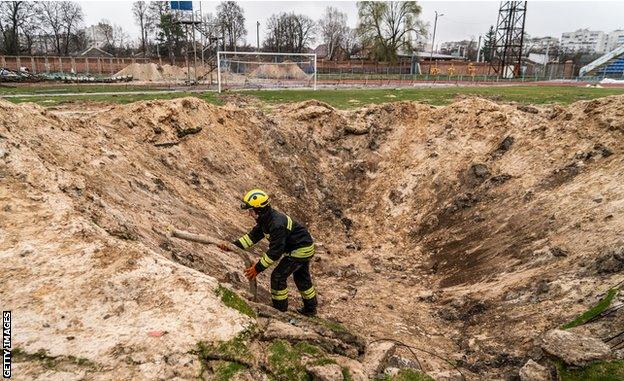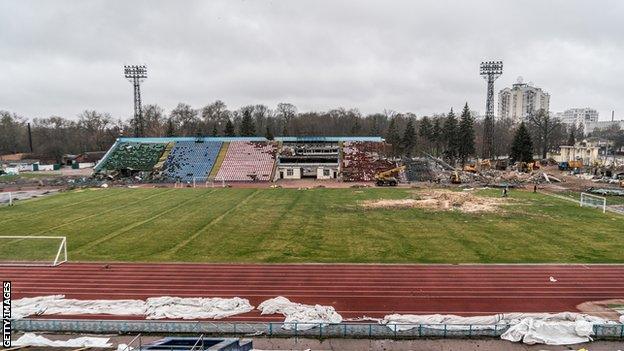Ukrainian Premier League set to restart: 'An act of bravery, but I'm worried'
- Published


Desna Chernihiv were seventh in the table when last season was cancelled
"My heart aches when I think of Kharkiv," says goalkeeper Denys Sydorenko. "A missile hit our training ground - there's nothing left of where we used to play."
On 22 February, Sydorenko's team, Metalist 1925 Kharkiv, were taking part in a regular training session during the Ukrainian Premier League's winter break. Two days later, everything stopped. Russia had invaded.
Now, six months into the war, Ukraine is preparing to resume its domestic football competitions - despite the constant danger the ongoing conflict brings.
The decision to cancel the remainder of the 2021-22 football season was finally taken in April. Shakhtar Donetsk were leading by two points with just over half of the matches played.
In July came word that the new campaign would go ahead from 23 August - Ukraine's Day of the National Flag - following an order from president Volodymyr Zelensky.
"Restarting football is a big step for the country," says Andriy Pavelko, head of the Ukrainian Football Association.
"It's a sign to the world that Ukraine can and will win. It's also a sign to society that we are confident."
Since Russia's invasion, many teams have relocated to cities such as Lviv in the west of the country - considered safer than other regions that have been more heavily targeted. Dynamo Kyiv are among those who plan to play in the capital or its surroundings.
Sydorenko's team have been training in Uzhhorod, on the border with Slovakia, about 1,300km from the city they call home. Parts of Kharkiv have been totally devastated by the war, with residents likening it to Chernobyl.
"When the players met up again we talked about everything - where everyone was when the war started, what they were doing," says Sydorenko, 33, who in February fled to western Ukraine with his girlfriend. They were married soon after.
"Now, we are working hard at training. We want to make our fans happy and win every match."
Ukrainian FA president Pavelko says discussions are continuing with the Ministry of Defence over how best to hold matches this season. For the moment it's expected spectators will not be able to attend. Approved stadiums will be equipped with air-raid sirens and bomb shelters.
"It's good that all leagues will play. This will raise everyone's spirits," he says.
Anna Myronchuk,who plays for Dynamo Kyiv's women's side, says her team is thrilled by the prospect of football's return. She says it helps takes their minds off the war - if only for a while.
"For every player it's a big joy to get back on the field, to play, to score a goal, to win," she says.
"But then we get back to our phones, look at the news and see what has happened."

Two of the teams that played in the cancelled campaign last season will be unable to compete in 2022-23
After Russia's invasion, a number of Myronchuk's team-mates were forced to live in a bunker for two weeks.
"No-one knew what would happen to football," says Dynamo's women's coach Volodymyr Petrenko.
"But our director did not abandon us, he paid us our wage. We had lessons on Zoom and gave the players individual tasks. We had a yoga teacher, but of course training alone is not the same."
Over the months that followed, Dynamo's men's team - plus Shakhtar and the national side - played a series of friendlies outside the country to raise aid money in a 'Global Tour for Peace'.
"During the first matches some of us cried after the national anthem," says Shakhtar goalkeeper Anatoily Trubin, who has twice played for Ukraine.
"Shakhtar raised me. I'm always happy when I put the Shakhtar shirt on."
Shakhtar have already spent eight years in exile because of conflict, having been forced to leave the eastern city of Donetsk when fighting broke out with pro-Russian separatists in 2014. Donetsk is now on the front line of the war with Russia.
As they were leading the league table when last season was cancelled, Shakhtar have already earned a place in the group stage of this year's Champions League, with Dynamo hoping to join them, while SC Dnipro-1 have a chance of reaching the Europa League.
Uefa requires Ukrainian sides' home ties in European competition be held outside the country - Dynamo will play the first leg of their qualification play-off against Benfica in Poland on Wednesday.
But while some teams are already back in the thick of it, two of last year's top-flight clubs are unlikely to return soon.
Desna Chernihiv were seventh in the table when Russia invaded in February. A city in the north of Ukraine close to the border with Belarus, Chernihiv had by March been completed surrounded by Russian troops.
The city was besieged night and day, with tens of thousands of people trapped. Some described civilian buildings and residential areas as being deliberately targeted.
Desna's home ground - formerly known as the Yuri Gagarin Stadium after the famous Soviet cosmonaut - was badly damaged. Members of the coaching team took up arms and joined in the city's defence, while the club helped raise funds for thermal imaging equipment and drones. The Russians withdrew in early April but there is much work to be done to rebuild.
Oleksandr Drambayev was playing for Mariupol FC when the invasion happened. The city was left in ruins after almost three months of relentless assault and is now in Russian hands.
"Mariupol FC doesn't exist now," says the 21-year-old defender, who was on loan from Shakhtar.
Drambayev was overseas when Russian tanks first rolled over the border in February. Just 15 minutes before boarding a flight back to Ukraine, he was told his country had been invaded.
Other team-mates started sending messages saying that missiles had struck buildings near their homes. Reality hit. He would not be going back. He was told to find a new team and is now on loan at Belgian side Zulte Waregem. But he still thinks fondly of his former club.
"I miss Mariupol with all my heart," he says.
"I'd fallen in love with the city. We had a beautiful pitch, it was just recently done with new grass. I brought my Mariupol shirt here and wear it.
"It's an act of bravery to restart football in Ukraine. I'm happy about it, but at the same time, I'm very worried."
Additional reporting by Svitlana Libet